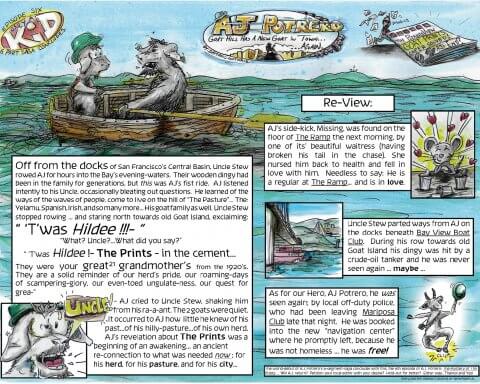This is chapter two of a serialized tale of politics, capitalism, and corruption in San Francisco. Look for the next fiction installment in each new issue of the View.
Chester inherited the property on which he operated the nursery from his father, Angelo. Angelo had fled Cyprus in the early-1960s, when he was just 16 years-old, propelled to America by a spasm of violence between Greek and Turkish Cypriots. His father was killed. He’d been separated from his mother and sister in the chaos at the docks; thousands of people pushing to get on boats bound for a dozen different ports. The rest of his family found passage to Greece, where they settled. It’d take Angelo thirty years, and the expenditure of no small amount of his wealth, to find them.
Angelo landed in New York with empty pockets and a head full of determination. He made his way west, stopping to work as a laborer in Chicago, Denver and smaller towns along the way, before arriving in San Francisco in the mid-1960s.
While the City’s tight community of Beats loosened into a growing conflagration of hippies, Angelo focused on making money. He joined a construction crew that bought and rehabilitated Victorians that’d been relocated to make way for Highway 101. Each crew member threw whatever cash he had into a pot to purchase a broken-down building, the deal sealed with Ouzo shots. Proceeds were shared equally after the house was sold.
By the summer of love Angelo had amassed enough money to buy several properties, and start a family. Chester was born, followed by his sister, Linda. But Angelo wasn’t happy. He watched in disgust as the children of the wealthy turned their backs on their families, squandered their inheritance on permanently filthy clothes, and their mental health on newly discovered drugs, as if privilege was a gift rather than something to be earned. He thought about his father, tending the family’s olive grove; his mother slapping clothes against rocks to get them clean. He turned his anger into greed, and greed into the single thing he loved except the past.
By the 1980s Angelo was a wealthy man. But it wasn’t enough. He purchased the Goodman Building, a rundown five-story structure that was originally constructed in the mid-19th century as a residential hotel. In the 1970s it’d become a squat for hippies, morphing into a kind of arts commune when Angelo bought it. It generated little in the way of rents, but San Francisco’s tight rent control laws made it difficult to dislodge any of the tenants.
Channeling all his fury over his lost homeland, murdered father, and missing family – forgetting that he’d created a new family in his adopted City – Angelo launched a campaign to rid his building of everyone. He planned to tear it down, and replace it with luxury condominiums catering to the City’s emerging technology class. When plumbing failed he didn’t fix it; sewage seeped around toilets and adjacent walls. He wandered the hallways with a large German Shepard, which would lunge at tenants if they passed within a couple of yards. A few of the occupants drifted away. But most stayed. They had nowhere else to go.
On October 17, 1989, a magnitude 6.9 earthquake hit San Francisco. Within moments a portion of the Bay Bridge collapsed; smoke curled up from a damaged apartment complex in the northwest corner of the City. When the quake struck, Angelo staggered out of the Greek restaurant, S. Asimakopoulos, where he’d been sipping thick coffee. He watched as the smoke drifted across the skyline. Later, fire erupted at the Goodman Building. Most of his tenants had scrambled out shortly after the earthquake. But three – a man in his seventies, as well as a couple who were later determined to have recently ingested methamphetamines – were inside when the building collapsed in on itself.
A San Francisco Fire Department investigation into the blaze traced its origin to a spilled gasoline canister in the building’s basement. How the liquid caught fire was a mystery. Officials suspected that shaking from the earthquake had tipped the canister over; the spilled contents had been ignited by sparks created by the scrapping of wood and metal objects, or perhaps from a damaged electrical wire. Nothing was ever proven.
A few weeks after the fire Angelo traveled to Tinos, in the Greek isles, following a tip suggesting that his family had settled there. He found his mother and sister. They were buried in a small graveyard next to a derelict church, killed more than 20 years previously in a car accident As Angelo brushed the dirt off of his mother’s tombstone, scratching at the letters to find what he’d lost, he had a stroke. He lay for a few moments, his arms weakly trying to pull the gravestone to his chest, not knowing who he was. And then he died.



